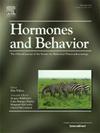草原田鼠在免疫挑战期间寻求与同伴的社会接触。
IF 2.5
3区 医学
Q2 BEHAVIORAL SCIENCES
引用次数: 0
摘要
尽管存在固有的疾病传播风险,但群居生活的选择在不同类群中都有发生。对疾病的行为和免疫反应会影响社会互动,并可能因社会环境而改变。然而,大多数关于疾病行为的研究都集中在不形成选择性社会关系的物种上。草原田鼠(Microtus ochrogaster)与配偶和同伴形成选择性社会关系,为研究疾病对已建立关系的社会寻求的影响提供了一个有用的研究系统。我们使用外周注射大肠杆菌脂多糖(LPS)来刺激先天性免疫系统,并验证了治疗后 6 小时内对活动、核心体温和皮质酮浓度的影响。我们证明,草原田鼠的雌雄同性配对在患病时会增加社会接触,而且当患病田鼠主动接触时,这种接触会持续增加。最后,我们使用装有两个杠杆和侧室的操作选择室评估了免疫挑战后的社会动机。田鼠努力进入有社交和非社交奖励的腔室。注射 LPS 后,田鼠的总体努力程度下降,但只有免疫挑战田鼠为同伴努力的程度明显高于为非社交室努力的程度。LPS 处理还增加了为同伴和陌生人赢得奖励的比例,并再次导致蜷缩行为的增加。之前对其他啮齿类动物的研究表明,生病时的社会互动会减少;本研究结果表明了生病在双亲关系中的另一种结果,并为今后在同伴关系中的研究奠定了基础。本文章由计算机程序翻译,如有差异,请以英文原文为准。
Prairie voles seek social contact with peer companions during immune challenge
Selection for group living has occurred across taxa, despite inherent risk of disease transmission. Behavioral and immune responses to sickness affect social interactions and can be altered by social contexts. However, the majority of research on sickness behavior has focused on species that do not form selective social relationships. Prairie voles (Microtus ochrogaster) form selective social relationships with mates and peers and provide a useful study system to examine effects of sickness on social seeking in established relationships. We used peripheral injections of lipopolysaccharide (LPS) of E. coli to stimulate the innate immune system and verified effects on activity, core temperature, and corticosterone concentrations for 6 h following treatment. We demonstrated that male and female same-sex pairs of prairie voles increase social contact when sick and that this increase persists when contact is initiated by the sick vole. Finally, we assessed social motivation following immune challenge using operant choice chambers equipped with two levers and side chambers. Voles worked to gain access to chambers with social and non-social rewards. While overall effort decreased following LPS injection, only immune-challenged voles worked significantly harder for their companion than for a non-social chamber. LPS treatment also increased proportion of rewards earned for the partner versus a stranger and again led to increased huddling behavior. Prior studies in other rodent species have shown decreased social interaction when sick; the present results demonstrate an alternative outcome of sickness in the context of dyadic bonds and lay the foundation for future work in peer companions.
求助全文
通过发布文献求助,成功后即可免费获取论文全文。
去求助
来源期刊

Hormones and Behavior
医学-行为科学
CiteScore
6.70
自引率
8.60%
发文量
139
审稿时长
91 days
期刊介绍:
Hormones and Behavior publishes original research articles, reviews and special issues concerning hormone-brain-behavior relationships, broadly defined. The journal''s scope ranges from laboratory and field studies concerning neuroendocrine as well as endocrine mechanisms controlling the development or adult expression of behavior to studies concerning the environmental control and evolutionary significance of hormone-behavior relationships. The journal welcomes studies conducted on species ranging from invertebrates to mammals, including humans.
 求助内容:
求助内容: 应助结果提醒方式:
应助结果提醒方式:


